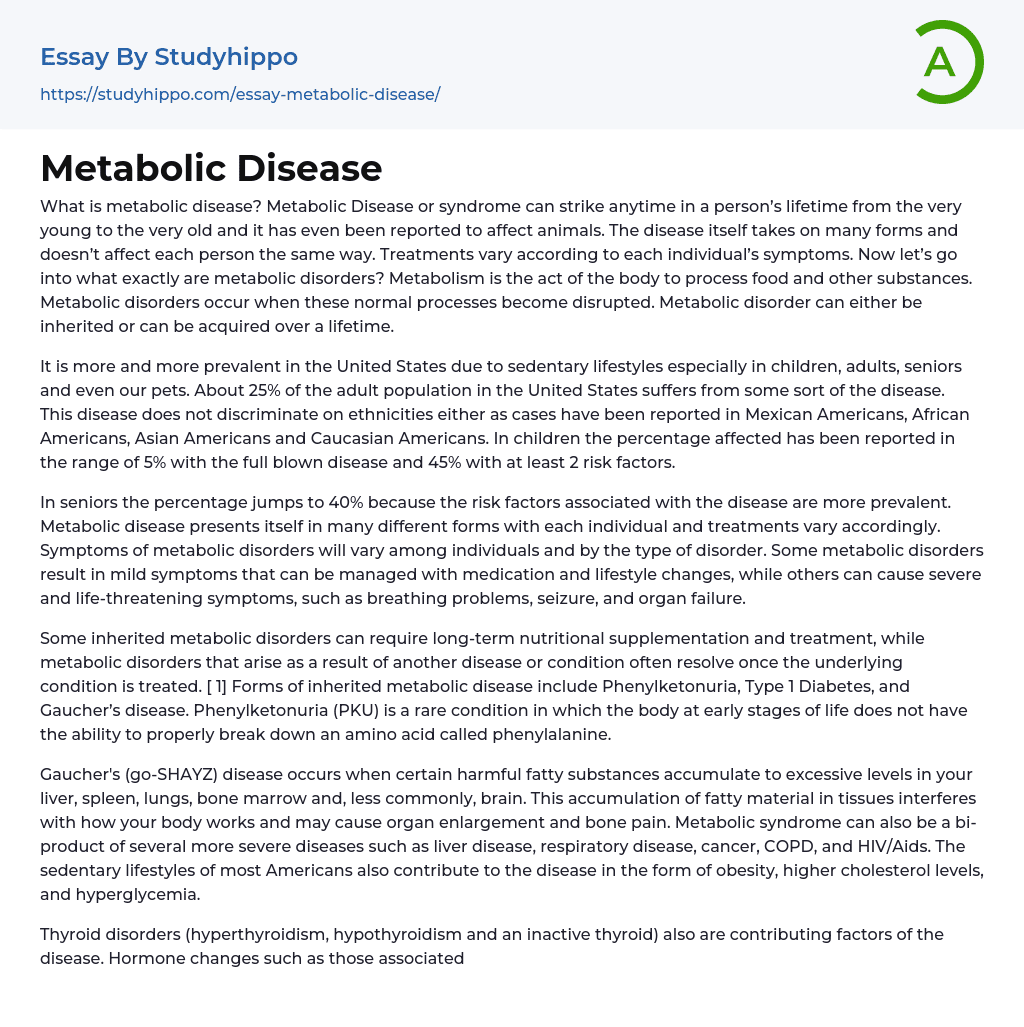Metabolic disease can impact people and animals of all ages, taking various forms and affecting individuals differently. The treatment approaches depend on the specific symptoms one experiences. Metabolic disorders occur when there is a disruption in the body's normal processes of metabolizing food and substances. These disorders can be inherited or acquired at any stage of life.
The occurrence of this disease is increasing in the United States due to inactive lifestyles. This includes people of all ages, including children, adults, seniors, and even pets. It is estimated that approximately 25% of adults in the United States are affected by this disease. Furthermore, instances have been reported in different ethnic groups like Mexican Americans, African Americans, Asian Americans, and Caucasian Americans. In children, the percentage affected varies from 5% with the complete condition to 45% with at least two risk factors.
n: justify">40% of seniors are affected by metabolic disease, with the prevalence of risk factors increasing. The types and treatments of metabolic disease differ, as well as the symptoms experienced by individuals with specific disorders. Some disorders may have mild symptoms that can be managed through medication and lifestyle changes, while others can result in severe symptoms such as breathing difficulties, seizures, and organ failure.
Certain inherited metabolic disorders may require extended nutritional supplementation and treatment, while metabolic disorders caused by another disease or condition usually improve after addressing the underlying issue.[1] Examples of inherited metabolic diseases include Phenylketonuria (PKU), Type 1 Diabetes, and Gaucher's disease. Specifically, PKU is a rare condition in which the body has difficulty metabolizing phenylalanine—an amino acid—during infancy.
The condition known as Gaucher's disease
is characterized by the excessive buildup of harmful fatty substances in various organs. These organs include the liver, spleen, lungs, bone marrow, and sometimes even the brain. This accumulation disrupts normal bodily functions and can lead to enlarged organs and bone pain. In addition to Gaucher's disease, other conditions such as liver disease, respiratory disease, cancer, COPD (chronic obstructive pulmonary disease), and HIV/AIDS can also cause metabolic syndrome. Sedentary lifestyles that are common among Americans contribute to this disease due to factors like obesity, high cholesterol levels, and hyperglycemia.
Thyroid disorders (hyperthyroidism, hypothyroidism, and an inactive thyroid) are additional factors that contribute to the disease. Hormone changes, like those in middle-aged women or women with preexisting conditions such as female sexual dysfunction, gestational diabetes, menstrual irregularities, polycystic ovary syndrome, and pregnancy-induced hypertension can also impact the disease. Managing metabolic syndrome symptoms involves addressing the main underlying causes of the condition and handling any associated risk factors.
Treatment options for Metabolic Disease are not specific. The focus is on addressing the risk factors, with the patient's lifestyle changes being crucial. Physicians commonly suggest simple modifications like exercise and healthy eating as initial recommendations. In cases where these lifestyle changes prove insufficient in reducing risk factors, medication may be necessary. Medications that can effectively manage and eliminate Metabolic Syndrome include those that lower cholesterol levels, control high blood pressure, and regulate Type 2 Diabetes.
The doctor typically prescribes customized medications to address specific aspects of the patient's metabolic syndrome. Although these medications can be effective, treatment must also take place in everyday life. Alongside medication, it is essential to make an active effort to select healthier
food options and engage in regular exercise. With sincere dedication, we can positively impact the progression of the syndrome. Ultimately, preventing this disease requires changing the patient's mindset towards a healthier lifestyle.
- Apoptosis essays
- Asthma essays
- Black Death essays
- Breast Cancer essays
- Cholesterol essays
- Chronic essays
- Chronic Pain essays
- Death essays
- Diabetes essays
- Down Syndrome essays
- Epidemic essays
- Hypertension essays
- Infection essays
- Infertility essays
- Myocardial Infarction essays
- Pain essays
- Pathogen essays
- Pregnancy essays
- Sexually Transmitted Disease essays
- Symptom essays
- Tuskegee Syphilis Experiment essays
- Water supply essays




